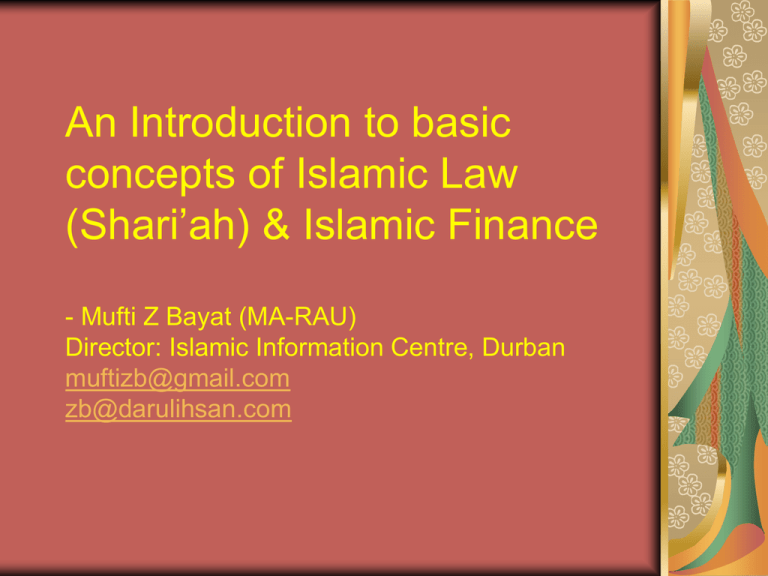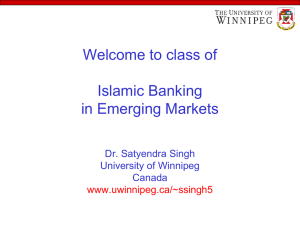Philanthropy
advertisement

An Introduction to basic concepts of Islamic Law (Shari’ah) & Islamic Finance - Mufti Z Bayat (MA-RAU) Director: Islamic Information Centre, Durban muftizb@gmail.com zb@darulihsan.com The Sharī‘ah (Islamic Law) literally means “the path to follow”, is a legal system that dates back 1400 years. It is based on revelation, which has its own underlying rationale. It differs from modern or conventional systems of law in two respects: the scope of Sharī‘ah is much wider: it is not merely a system of law, but a comprehensive code of behaviour that embraces both private and public activities Islamic concept of law is based on Divine revelation: In Islamic jurisprudence it is not the society of law makers alone that mould and fashion the law, but law that is rooted in divine revelation SCOPE OF ISLAMIC LAW Worship and rituals Dietary Law (Halaal edibles) Family Law Commercial/Finance Law Criminal Law Administrative & International Law Ethics, Etiquette and Values Characterisation of Shariah rules: Obligatory (wājib, fard) Desirable but not obligatory (sunna, mandūb) Neutral (mubāh) Undesirable but not prohibited (makrūh) Prohibited (harām) Islamic Commercial / Finance Law covers issues such as - trade, leasing & hiring, debts, interest, gifts, endowments, deposits, guarantees, agency, partnerships, unethical financial practices, etc. - Islamic Law (Shari’ah) based on justice and equity to safeguard overall interests of mankind - Commercial Law of Islam secures propriety rights of mankind by prescribing ethics & fairness and prohibiting exploitation & usurpation ISLAMIC ECONOMICS: Three Global Economic systems Capitalism Socialism Islam Comparison between 3 Economic Systems Prohibitions in Financial Activities Avoidance of Haraam Transactions Avoiding all forms of unethical activities such as gambling, drugs, pornography or dubious transactions Avoidance of Qimar Gambling and Chance Based (zero-sum) transactions Avoidance of Interest (riba) Risk-free or guaranteed rate of return on loaned money or investment Equity & Ethics in Islamic Financial Activities Avoidance of Jahala Clarity of intentions and transparency is imperative in all dealings Avoidance of Gharar Excessive uncertainty in contracts – eg. entering into transaction consequence is out of usual trade norms – a) Financial Derivatives b) Insurance Contracts Avoidance of Exploitation Contracts to reflect justice and fairness Stocks & Equities – Islamic rules: Qualitative Filters The main business of that particular company should not violate Shari’ah. Businesses such as financial services, entertainment, alcohol, gambling etc. are not permitted for investment Quantitative filters Certain financial ratios and criteria need to be met – not highly geared, minimal impermissible income Results (Financial Statements) and Prospectuses (Memorandum & Articles) of companies are scrutinised The rise of Islamic Investment The Islamic investment fund market is one of the fastest growing sectors within the Islamic financial system Assets managed in these funds currently exceed USD 5 billion and is growing at around 15% per annum Prohibited areas include abortion, alcohol, armament, gambling, human cloning and pornography. The usury prohibition bars investment in conventional banks and insurers and any company that has a gearing of more than 30% ISLAMIC BANKING: OVERVIEW Globally Islamic banking has made a considerable impact on financial services market 235 players in global Islamic banking industry with $309bn in assets Conventional banks entering Islamic Banking arena – with “Islamic windows” potential cannot be ignored (Wesbank, ABSA, Standard, Old Mutual) Islamic banking industry expected to grow to $1 trillion in 2010 AAOIFI – Bahrain-based international regulating body – Accounting & Auditing Organisation for Islamic Financial Institutions COMPARISON Islamic Banks: Basic principles 1. The functions and operating modes of Islamic banks are based on the principles of Islamic Law (Shariah-based) 2. It promotes risk sharing between provider of capital (investor) and the user of funds (entrepreneur) 3. It aims at maximizing profit but subject to Shariah restrictions 4. Participation in partnership business is the fundamental function of the Islamic banks 5. The Islamic banks have no provision to charge any extra money from the defaulters. Only small amount of penalty and these proceeds are given to charity 6. Since it shares profit and loss, the Islamic banks pay greater attention to developing project appraisal and evaluations 7. Islamic banks give greater emphasis on the viability of the projects 8. The status of Islamic bank in relation to its clients is that of partners, investors and trader, buyer and seller 9. If the account is based on the participation concept, client has to share in loss Conventional Banks: Basic Principles 1. The functions and operating modes of conventional banks are based on man-made principles 2. The depositor is assured of a predetermined rate of interest 3. It aims at maximizing profit without any restriction 4. Lending money and getting it back with compounded interest is the fundamental function of the conventional banks 5. It can charge additional money (penalty and compounded interest) in case of default 6. Since income from the advances is fixed, it gives little importance to developing expertise in project appraisal and evaluations 7. Conventional banks give greater emphasis on credit-worthiness of the clients 8. The status of a conventional bank, in relation to its clients, is that of creditor and debtors 9. A conventional bank has to guarantee all its deposits MODES OF ISLAMIC BANKING Qardh/Wadiah – Current account Murabahah – Cost plus profit Mudharabah – Participation Musharakah – Equity based Diminishing Musharakah – asset finance Ijarah – Lease Salam – forward sale Istisna – project financing GENERAL ISLAMIC PRINCIPLES GOVERNING CONTRACTS (1) 1. All contracts and transactions are deemed permissible unless rendered unlawful by a prohibiting factor. The broad principal of Shariah holds true: االصل في االشياء االباحة- “All things in Shari’ah are in their original nature lawful and permitted” All things are permissible unless prohibited by specific texts from Quran and Sunnah or rulings derived from these or contradict the objectives of the Shariah 2. Free and natural consent of parties. Thus consent obtained due to coercion, fraud, misrepresentation or in intoxication, or in jest or mistake or done fictitiously will invalidate contract GENERAL PRINCIPLES (2) 3. Gharar – which maybe broadly defined as uncertainty of the outcome of a contract which could lead to disputation and litigation - Examples of Gharar – based transactions: 1. Transaction based on object which may be nonexistent 2. Transaction based on object whose quantum is unknown 3. Transaction based on object whose acquisition is doubtful 4. Transaction based on object unknown to the parties 5. Transaction based on an event unsure of occurrence - Gharar would entail sale of fish in water, birds in the air, foetus in the womb, crops that may grow in future, etc. GENERAL PRINCIPLES (3) 4. Interest based (Riba) 5. Maysir – Speculative transactions 6. Deception – Tasriyah, Najash, Ghabn-Fahish, Tatfif, etc. 7. Conditional/contingent transactions (Bay-wa-shart) 8. Combined transactions (safaqa-fisafaqatain) RECOMMENDED READING Introduction to Islamic Finance – Mufti Taqi Usmani (downloadable) Dr Umer Chappra Dr Najatullah Siddiqui Dr Yusuf De Lorenzo Dr Khurshid Ahmed Dr Rushdie Siddiqui THE END Questions ??








